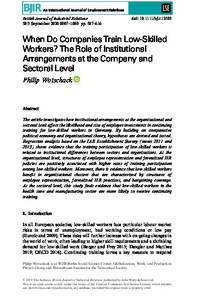When do companies train low‐skilled workers? The role of institutional arrangements at the company and sectoral level

British Journal of Industrial Relations
2020
58
3
September
587-616
vocational training ; unskilled worker ; enterprise level ; continuing vocational training
Education and training
https://doi.org/10.1111/bjir.12503
English
Bibliogr.
"The article investigates how institutional arrangements at the organizational and sectoral level affect the likelihood and size of employer investments in continuing training for low‐skilled workers in Germany. By building on comparative political economy and organizational theory, hypotheses are derived and tested. Regression analysis based on the IAB Establishment Survey (waves 2011 and 2013) shows evidence that the training participation of low‐skilled workers is related to institutional differences between sectors and organizations. At the organizational level, structures of employee representation and formalized HR policies are positively associated with higher rates of training participation among low‐skilled workers. Moreover, there is evidence that low‐skilled workers benefit in organizational clusters that are characterized by structures of employee representation, formalized HR practices, and bargaining coverage. At the sectoral level, this study finds evidence that low‐skilled workers in the health care and manufacturing sector are more likely to receive continuing training."
Digital
The ETUI is co-funded by the European Union. Views and opinions expressed are however those of the author(s) only and do not necessarily reflect those of the European Union or the ETUI.